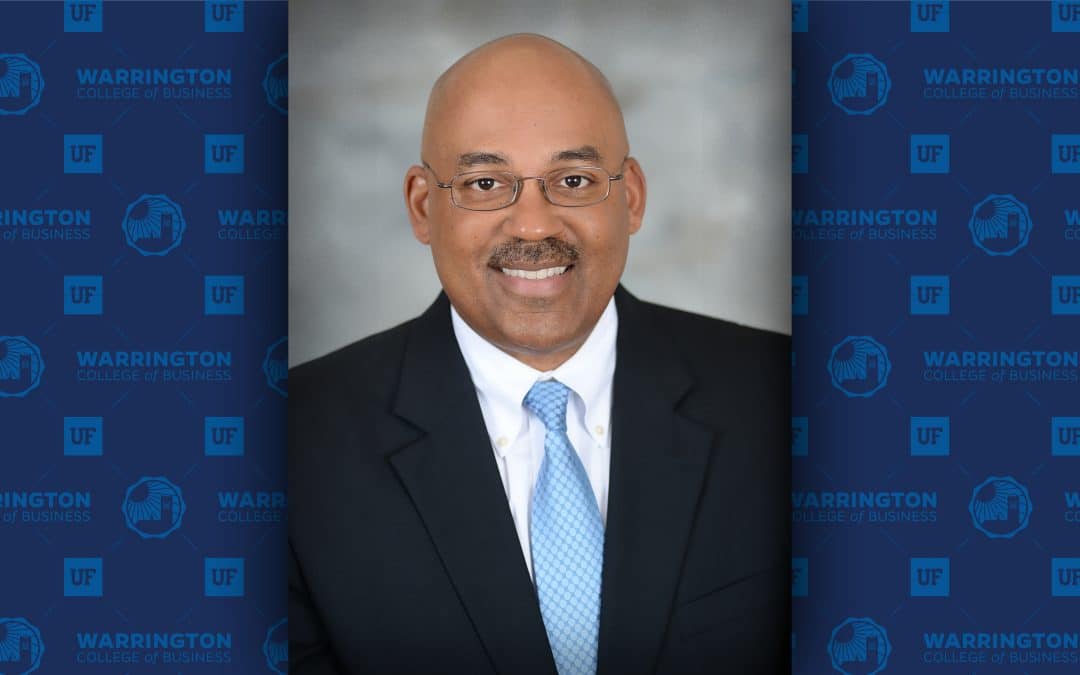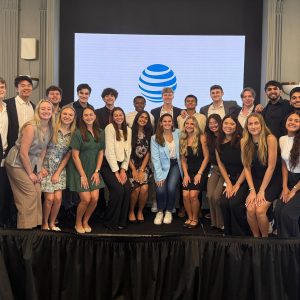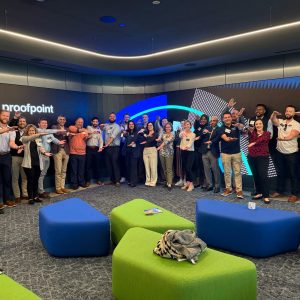Sustaining the ‘language of business’
With nearly a 30-year career in higher education, Mark Dawkins is on a mission to ensure accounting students are well prepared to enter the workforce with the skills their employers need to thrive.
Mark Dawkins (MBA ’87, MAcc ’88) had long been interested in tinkering with objects, like clocks, radios and other mechanical items. His interest ran deep enough to persuade him to begin his college career at Georgia Tech as a mechanical engineering major.
A few classes in, and Dawkins realized that, despite his curiosity with fixing things, he didn’t really want to be an engineer. What stood out to him, though, was his continued interest in how to solve problems using logic and rules. The subject of accounting seemed like the next best option for his studies.
“The logic of accounting, to me, equated to the logic of engineering,” he said. “If you apply the rules in a logical manner, then you should be able to come to logical conclusions.”
After completing his degree, Dawkins left Atlanta and returned to his home state of Florida to pursue a graduate business degree at the University of Florida. While working towards his MBA, and later his Master of Accounting degree, Dawkins worked for the UF Athletic Association as a tutor for student-athletes who were taking finance and accounting courses. In addition to tutoring, Dawkins also served as a substitute teacher while working as a graduate assistant at the Warrington College of Business.
“The student-athletes often said I did a good job explaining difficult material, and they suggested I become a professor,” he recalled. “These experiences put a teaching bug in my brain.”
While Dawkins would spend two years in corporate banking after completing his MBA and Master of Accounting degrees, he never forgot the personal fulfillment he got from teaching. Dawkins then made the decision to return to school to earn his Ph.D. in accounting.
“I didn’t see corporate banking as the path I wanted to take for the rest of my career,” he said. “That’s when I decided to pursue a Ph.D. in accounting. Since then, I’ve never looked back. Teaching was the best path for me.”
Dawkins attended Florida State University for his Ph.D., but still gives credit to the faculty at the University of Florida with helping to prepare him for a successful career in higher education.
“I had great teachers at UF who delivered quality instruction in the classroom, and so I was well prepared to pursue a Ph.D. in accounting,” he said.
Over the course of his nearly 30-year career in higher education, Dawkins has served as a tenured professor of accounting at the University of Georgia (UGA) and University of North Florida (UNF), where he currently serves as a Professor of Accounting.
One of Dawkins’ most important goals in the classroom is to help students successfully master challenging subjects. As someone who teaches Intermediate Accounting I, which many students view as a weed-out class, Dawkins notes that the best thing he can do to help students is to demystify difficult accounting topics.
“My goal every semester is to work with students to help as many as possible successfully complete my class, so I am very student focused when I teach,” he said. “I give my students my cell number and encourage them to call me from 8 am to 9 pm, and I hold extensive office hours and Zoom sessions with students to give them every opportunity to succeed. Their success is my success!”
In addition to his faculty roles, Dawkins has also served in administrative positions including Director of Diversity Relations and Associate Dean for Academic Programs at UGA’s Terry College of Business as well as a five-year tenure as Dean of UNF’s Coggin College of Business.
Dawkins’ 15 years of higher education administrative experience has given him first-hand insights into how to best prepare students for careers in business. Change is the most important thing that students should be prepared for in their career, Dawkins said.
“For example, technology is changing the requirements of many jobs and how the work gets done, and I expect such changes to continue,” he said. “This requires students and graduates to be prepared to constantly expand and improve their skills during their careers.”
The burden isn’t just on students, though, he noted.
“It also requires business schools to expand degree and executive education programs to meet these needs,” he said. “The market will continue to drive changes for students and business schools.”
Dawkins put that perspective into play by adding four new degree programs to UNF’s offerings during his time as dean including a Master of Science in Management, Master of Science in Logistics and Supply Chain Management, Master of Business Analytics and a BBA in Business Intelligence.
Dawkins is also working to drive change in the accounting industry, this time by serving as the President of the American Accounting Association (AAA). Starting his three-year tenure last year, Dawkins is the first African American President of the AAA. He was elected to the role in 2021 on the 100th year anniversary of the first African American to be granted a CPA in the United States, John W. Cromwell, Jr. in 1921.
Over the past several years, accounting degree programs have seen declining enrollments. Some accounting programs at public universities have seen declines of 20-30% and private universities have experienced declines of 30-50%, Dawkins shared.
“My theme for this year is ‘Sustaining the Profession,’ and my focus is on sensitizing accounting faculty to the challenges declining enrollments pose to the future of accounting programs and faculty positions,” he said.
Dawkins believes the key to sustaining the accounting profession is in faculty and industry collaboration, more specifically, for faculty lessons to help fill in the skill gaps that employers say are lacking in recent accounting graduates.
According to surveys by the American Institute of Certified Public Accountants and the National Association of State Boards of Accountancy, skills like data analytics, IT auditing, predictive analysis, cybersecurity, among others, are the skills that accounting firms need, but students aren’t regularly taught during their time in college at many accounting programs.
“Accounting departments must update their curricula to meet the demands of practice by closing [these] skill gaps,” he said. “This is an all-hands-on-deck moment. Organizations and firms are trying to move the boat in the right direction, but it takes faculty engagement and participation to get it there.”
Despite some lower enrollments, Dawkins notes that accounting will always be the language of business, and that won’t change anytime soon.
“Stakeholders must understand financial statements to make appropriate capital allocation and investment decisions,” he said. “Accountants will always be needed to help prepare this information, so great careers will continue to exist in auditing, tax and consulting. However, accountants need to be better ‘strategic business advisors’ in the future to add increasing value to clients, and this requires a forward-looking rather than historical-looking focus.
“I believe this expanded forward-looking focus is the future of accounting which will create new and exciting career paths beyond existing audit, tax and consulting careers.”




